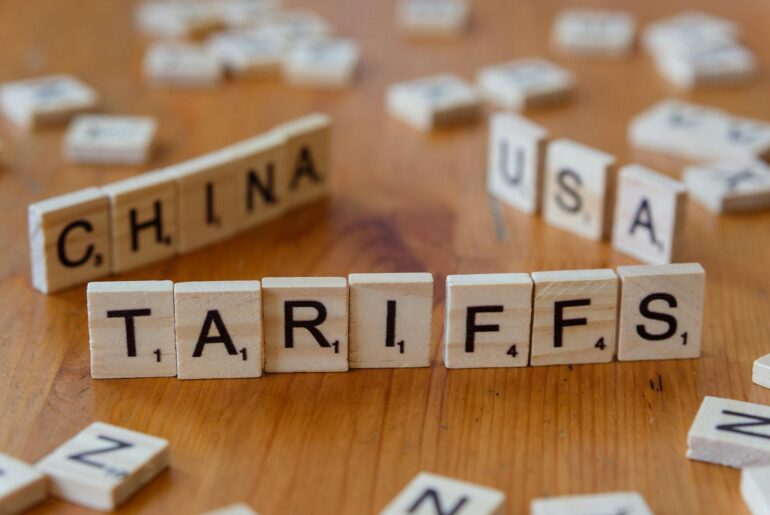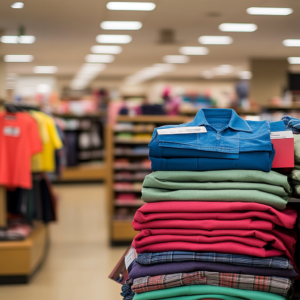This article may contain references to products or services from one or more of our advertisers or partners. We may receive compensation when you click on links to those products or services. Nonetheless, our opinions are our own.
The information presented in this article is accurate to the best of our knowledge at the time of publication. However, information is subject to change, and no guarantees are made about the continued accuracy or completeness of this content after its publication date.
You’re likely feeling the ripple effects of changing trade policies and tariffs. With the ongoing discussions around tariffs imposed during the Trump administration, many consumers and businesses seek clarity on how these changes impact their shopping choices and budgets. Amid this uncertainty, some retailers have managed to navigate these turbulent waters, emerging seemingly immune to the challenges of tariffs. We will explore four major retailers that have successfully adapted to shifting economic conditions, allowing you to shop confidently, knowing they can withstand the impact of potential trade conflicts. Join us as we delve into what makes these retailers stand out and how they redefine resilience in adversity.
- Understanding the Unique Positioning of Resilient Retailers
- Identifying Key Features That Shield Retailers from Tariffs
- Exploring the Strategies Behind Their Continued Success
- Practical Tips for Supporting Brands That Weather Economic Storms
- Your Role in Fueling Resilience Through Thoughtful Consumer Choices
- How to Adapt Your Retail Habits for Financial Security
- Frequently Asked Questions
- Recommended Reads
Understanding the Unique Positioning of Resilient Retailers
Resilient retailers have a knack for navigating the turbulent waters of economic changes, and their strategies often make them appear immune to external pressures like tariffs. By honing in on a few vital attributes, these businesses stay afloat and thrive, adapting to consumer demands and market shifts with ease. When evaluating their unique positioning, consider the following characteristics:
Key Characteristics of Resilient Retailers
- Flexible Supply Chains: These retailers have diversified their supply chains, sourcing from multiple regions to mitigate risks associated with tariffs and trade tensions.
- Strong Brand Loyalty: Resilient retailers foster deep connections with customers, maintaining sales even when prices fluctuate, allowing them to weather economic storms more effectively.
- Innovative Product Offerings: They continuously refresh their product lines, ensuring they meet consumer needs and preferences and keeping demand strong regardless of external pressures.
- Agile Operational Strategies: They implement lean operational practices that allow for rapid adjustments in pricing and inventory, making them less susceptible to rising costs.
Additionally, technology plays a significant role in their resilience. Retailers investing in data analytics and customer feedback loops are better positioned to predict trends and respond proactively, thus outperforming their less adaptable counterparts.
| Retailer | Key Strategy | Outcome |
|---|---|---|
| Retailer A | Supply Chain Diversification | Increased flexibility and reduced costs |
| Retailer B | Customer Loyalty Programs | Steadfast sales during volatility |
| Retailer C | Technological Integration | Enhanced operational efficiency |
| Retailer D | Product Innovation | Market leadership and customer retention |
Identifying Key Features That Shield Retailers from Tariffs
When examining the retail landscape in the face of tariffs, it’s clear that some retailers have developed strategies that effectively shield them. Here are a few key features that enable these industry leaders to navigate tariffs without significantly affecting their bottom line:
- Diverse Supply Chains: Many retailers have established multiple sourcing options, meaning they’re not solely reliant on a single country for products. This diversification allows them to shift production to regions less impacted by tariffs.
- In-House Manufacturing: Companies that produce goods domestically can often escape the harsh impacts of international tariffs, maintaining a competitive edge while supporting local economies.
- Strong Relationships with Suppliers: Retailers cultivating robust partnerships often benefit from negotiated terms that help absorb tariff costs or maintain pricing stability.
- Technological Advancements: Investing in technology and automation can reduce operational costs, allowing retailers to offset potential losses from tariffs and keep prices stable for consumers.
Many retailers are agile, quickly adapting their strategies to market shifts. They leverage market intelligence and analytics to forecast trends and make data-driven decisions that position them favorably against tariff-related challenges.
Exploring the Strategies Behind Their Continued Success
Certain retailers have demonstrated remarkable resilience in today’s rapidly changing economic landscape, successfully navigating challenges posed by external factors such as tariffs. Innovation stands at the forefront of their strategy, with companies leveraging technology to streamline operations and enhance customer experiences. For instance, investing in automated inventory management systems allows them to respond quickly to fluctuations in demand, reducing waste and optimizing stock levels.
Another pillar of their success lies in strategic sourcing. These retailers have developed robust supply chains that prioritize diversification and source products from various regions to minimize risk. By avoiding dependency on any single market, they ensure stability and continuity. A focus on sustainability also resonates with consumers, helping to forge brand loyalty.
| Strategy | Effect |
| Automated Inventory | Reduced operational costs |
| Diverse Sourcing | Minimized supply chain risks |
| Customer Engagement | Strengthened customer loyalty |
Voted "Best Overall Budgeting App" by Forbes and WSJ
Monarch Money helps you budget, track spending, set goals, and plan your financial future—all in one app.
Get 50% OFF your first year with code MONARCHVIP
Practical Tips for Supporting Brands That Weather Economic Storms
When looking to support retailers that can withstand economic uncertainties, consider these practical strategies to enhance your shopping habits and make informed choices:
- Research Brands Thoroughly: Before purchasing, take a moment to delve into the brands’ resilience. Look for companies with diverse supply chains or have adjusted their business models to minimize tariff impacts.
- Prioritize Customer Loyalty Programs: Engaging with retailers that offer robust loyalty programs rewards your shopping and strengthens the brand during tough economic times.
- Support Sustainable Practices: Brands that focus on sustainability often appeal to conscious consumers. By supporting eco-friendly companies, you help the environment and invest in brands likely to maintain consumer loyalty and resist economic fluctuations.
- Stay Informed: Follow industry news and updates concerning your favorite retailers. Knowledge about their financial health or strategic responses to challenges can guide your shopping decisions.
| Brand | Resilience Factor | Customer Loyalty Program |
| Retailer A | Diverse Supply Chain | Yes |
| Retailer B | Strong Online Presence | Yes |
| Retailer C | Sustainable Practices | No |
| Retailer D | Innovative Business Model | Yes |
Your Role in Fueling Resilience Through Thoughtful Consumer Choices
Every purchase you make can shape your budget and the broader economic landscape. By making informed choices about where and how you spend your money, you contribute to the resilience of companies that align with your values and priorities.
| Retailer | Resilience Factors |
| Costco | Strong membership base, bulk buying, diverse suppliers |
| Walmart | Extensive supply chain management, large-scale operations |
| Amazon | Diverse product range, innovative logistics, technological investment |
| Target | Private label products, adaptive sourcing strategies |
How to Adapt Your Retail Habits for Financial Security
Adapting your shopping habits is crucial for maintaining financial security. Consider steering your shopping decisions toward retailers that demonstrate resilience against economic fluctuations and external pressures like tariffs. Here are some strategies to enhance your retail habits:
- Prioritize Essentials: Focus on purchasing what you truly need rather than engaging in impulse buying.
- Research Alternatives: Discover retailers that offer similar products at competitive prices, including local businesses or online marketplaces.
- Utilize Memberships: Many chains offer loyalty programs that provide discounts or exclusive deals.
- Stay Informed: Keep up with price trends and retailer policies to make informed shopping decisions.
| Retailer | Type of Goods | Price Stability | Loyalty Programs |
| Costco | Groceries, Household Essentials | High | Yes |
| Walmart | General Merchandise | Consistent | Yes |
| Target | Apparel, Household Goods | Moderate | Yes |
| Home Depot | Home Improvement | Stable | Yes |
Frequently Asked Questions
What retailers are considered immune to tariffs?
Retailers such as Walmart, Costco, Target, and Home Depot have adapted their supply chains and sourcing strategies to minimize the impact of tariffs on their products.
How do these retailers avoid tariff impacts?
They diversify sourcing locations, invest in domestic production, and adjust their supply chains to reduce dependency on imports that carry additional costs.
What are the potential long-term effects of increasing tariffs?
Retailers may reassess their sourcing strategies and potentially raise prices, but their strong market positions and adaptability help mitigate these effects.

Reviewed and edited by Albert Fang.
See a typo or want to suggest an edit/revision to the content? Use the contact us form to provide feedback.
At FangWallet, we value editorial integrity and open collaboration in curating quality content for readers to enjoy. Much appreciated for the assist.
Did you like our article and find it insightful? We encourage sharing the article link with family and friends to benefit as well - better yet, sharing on social media. Thank you for the support! 🍉
Article Title: 4 Major Retailers That Are Immune to Trump’s Tariffs
https://fangwallet.com/2025/03/15/4-major-retailers-that-are-immune-to-trumps-tariffs/The FangWallet Promise
FangWallet is an editorially independent resource - founded on breaking down challenging financial concepts for anyone to understand since 2014. While we adhere to editorial integrity, note that this post may contain references to products from our partners.
The FangWallet promise is always to have your best interest in mind and be transparent and honest about the financial picture.
Become an Insider

Subscribe to get a free daily budget planner printable to help get your money on track!
Make passive money the right way. No spam.
Editorial Disclaimer: The editorial content on this page is not provided by any of the companies mentioned. The opinions expressed here are the author's alone.
The content of this website is for informational purposes only and does not represent investment advice, or an offer or solicitation to buy or sell any security, investment, or product. Investors are encouraged to do their own due diligence, and, if necessary, consult professional advising before making any investment decisions. Investing involves a high degree of risk, and financial losses may occur including the potential loss of principal.
Source Citation References:
+ Inspo
There are no additional citations or references to note for this article at this time.












































